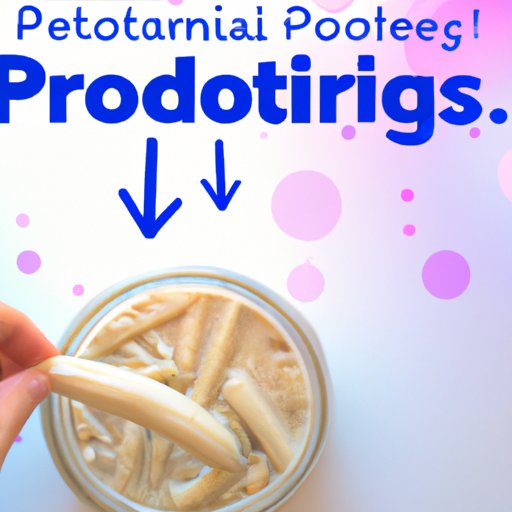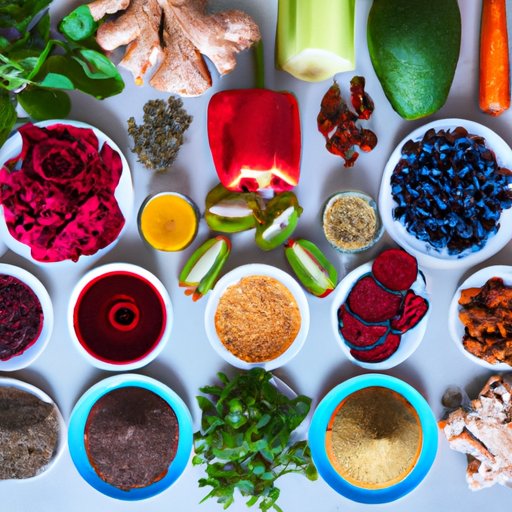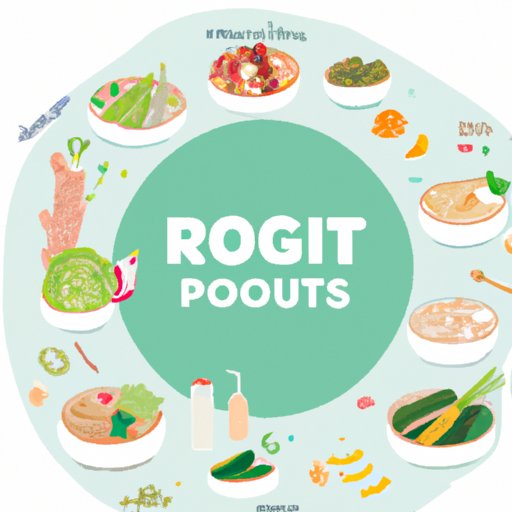Introduction
Good gut health is essential for overall wellbeing, but it can be difficult to know which foods are best for maintaining a healthy gut. This article provides a comprehensive guide to eating for a healthy gut, with research-based advice on the best gut-friendly foods, tips for creating a balanced diet, and an exploration of the benefits of probiotic and prebiotic foods, fermented foods, fiber-rich foods, and superfoods.
Definition of Gut Health
Gut health refers to the balance of bacteria in the digestive system. When the microbiome, or the collection of bacteria living in the digestive tract, is out of balance, it can lead to a variety of health issues such as inflammation, immune system dysfunction, and even mental health problems. A healthy gut is essential for overall wellbeing, so it’s important to maintain a balanced diet that supports gut health.
Research-Based Guide to the Best Gut-Friendly Foods
What Are Gut-Friendly Foods?
Gut-friendly foods are those that contain beneficial bacteria and other compounds that help to support a healthy microbiome. These include probiotic and prebiotic foods, fermented foods, fiber-rich foods, and superfoods. All of these foods provide unique benefits for gut health, and they can be incorporated into a balanced diet for optimal gut health.
Examples of Gut-Friendly Foods
Probiotic and prebiotic foods are two of the most important types of gut-friendly foods. Probiotics are live microorganisms that can help to restore balance to the microbiome. Examples of probiotic foods include yogurt, kefir, sauerkraut, kimchi, miso, and kombucha. Prebiotics are non-digestible compounds that feed the beneficial bacteria in the gut. Examples of prebiotic foods include garlic, onions, artichokes, leeks, bananas, apples, and oats.
Fermented foods are another type of gut-friendly food. Fermentation is a process in which microorganisms break down carbohydrates and produce lactic acid, which helps to preserve the food. Fermented foods also contain beneficial bacteria that can help to balance the microbiome. Examples of fermented foods include yogurt, cheese, pickles, kimchi, sauerkraut, tempeh, and kombucha.
Fiber-rich foods are also important for gut health. Fiber is a type of carbohydrate that the body cannot digest, but it helps to feed the beneficial bacteria in the gut. High-fiber foods include legumes, whole grains, fruits, vegetables, nuts, and seeds.
Finally, superfoods are nutrient-dense foods that have been linked to a variety of health benefits, including improved gut health. Examples of superfoods for gut health include blueberries, avocado, olive oil, dark chocolate, green tea, turmeric, ginger, and garlic.
How To Create a Gut-Friendly Diet
Choosing the Right Foods
When creating a gut-friendly diet, it’s important to choose the right foods. Aim to include a variety of probiotic and prebiotic foods, fermented foods, fiber-rich foods, and superfoods. Additionally, be sure to limit processed and sugary foods, as these can disrupt the balance of bacteria in the gut.
Tips for Creating a Balanced Diet
Creating a balanced diet for gut health requires some planning. Start by making a list of the foods you want to include in your diet. Aim to include plenty of fresh fruits and vegetables, whole grains, lean proteins, and healthy fats. Additionally, be sure to drink plenty of water throughout the day to stay hydrated and keep your digestive system functioning properly.

Exploring the Benefits of Probiotic and Prebiotic Foods
What are Probiotics and Prebiotics?
Probiotics are live microorganisms that can help to restore balance to the microbiome. They are found in certain fermented foods, such as yogurt, kefir, sauerkraut, kimchi, and kombucha. Prebiotics are non-digestible compounds that feed the beneficial bacteria in the gut. They are found in certain plant-based foods, such as garlic, onions, artichokes, and leeks.
How Do They Help with Gut Health?
Probiotics and prebiotics both help to maintain a healthy microbiome. Probiotics help to restore balance to the microbiome by introducing beneficial bacteria. Prebiotics help to nourish the beneficial bacteria in the gut, allowing them to thrive and maintain a healthy balance. Eating a diet rich in probiotic and prebiotic foods can help to promote a healthy gut.
The Health Benefits of Fermented Foods
What are Fermented Foods?
Fermented foods are foods that have been exposed to microorganisms, such as yeast or bacteria, to produce lactic acid. This process helps to preserve the food and adds flavor. Examples of fermented foods include yogurt, cheese, pickles, kimchi, sauerkraut, tempeh, and kombucha.
What are the Health Benefits?
Fermented foods are a great source of beneficial bacteria, which can help to balance the microbiome. They are also rich in vitamins and minerals, and they can help to improve digestion and boost the immune system. Additionally, fermented foods are low in calories and fat, making them a great addition to any weight loss plan.
Eating for a Healthy Gut: A Look at Fiber-Rich Foods
What is Fiber?
Fiber is a type of carbohydrate that the body cannot digest, but it helps to feed the beneficial bacteria in the gut. It is found in plant-based foods, such as fruits, vegetables, legumes, whole grains, nuts, and seeds.
What are the Benefits of Eating High-Fiber Foods?
Fiber is essential for gut health. It helps to feed the beneficial bacteria in the gut, allowing them to thrive and maintain a healthy balance. Additionally, fiber helps to keep digestion regular and may even help to reduce cholesterol levels. Aim to include plenty of high-fiber foods in your diet for optimal gut health.

Superfoods for Optimal Gut Health
What are Superfoods?
Superfoods are nutrient-dense foods that have been linked to a variety of health benefits. They are packed with vitamins, minerals, antioxidants, and other compounds that can help to boost overall health and wellbeing.
Examples of Superfoods for Gut Health
Some of the best superfoods for gut health include blueberries, avocado, olive oil, dark chocolate, green tea, turmeric, ginger, and garlic. These foods are packed with beneficial compounds that can help to promote a healthy gut. Incorporate them into your diet for optimal gut health.
Conclusion
Good gut health is essential for overall wellbeing, and eating the right foods can help to maintain a healthy microbiome. This article provided a comprehensive guide to eating for a healthy gut, with research-based advice on the best gut-friendly foods, tips for creating a balanced diet, and an exploration of the benefits of probiotic and prebiotic foods, fermented foods, fiber-rich foods, and superfoods. Incorporate these gut-healthy foods into your diet for optimal gut health.
(Note: Is this article not meeting your expectations? Do you have knowledge or insights to share? Unlock new opportunities and expand your reach by joining our authors team. Click Registration to join us and share your expertise with our readers.)
